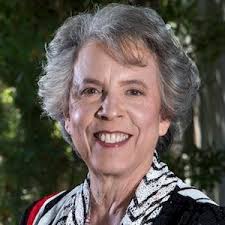How to Get Good at Getting Older: Q&A with Author Laura Geller
Getting Good at Getting Older, by Richard Siegel and Rabbi Laura Geller, was named a 2019 National Jewish Book Award Finalist. It is a tour for all of us of a certain age to explore the resources and skills to navigate the years between maturity and old age, told with bringing humor, warmth, and more than 4,000 years of Jewish experience.
"A bedside companion, a portable best friend, and a baedeker of essential resources for anyone smart enough to age mindfully rather than just let it happen to them." - Letty Cottin Pogrebin, founding editor of Ms. magazine

Author Laura Geller describes how the book came to life.
What drew you to this subject? What inspired the book?
Several years before my retirement, I began to be interested in what the next stage of my life would be like. I noticed that my congregation, like so many others, had a large percentage of baby boomers and those slightly beyond, and that many in this cohort were leaving the congregation because they felt overlooked. Yet ironically, they were at a stage in their life where they had time to explore spiritual questions and so they wanted opportunities for study, prayer and deeper connections. We decided to do a listening campaign with congregants in this cohort, involving more than 250 people in small group gatherings in people’s homes. The conversations were really powerful. People understood that this was a new life stage, between midlife when they raised their families and built their careers, and frail old age. Four themes emerged: spirituality, giving back, feeling part of a community, and concerns about themselves and people they loved getting older. The most important project that came out of that listening campaign was the creation of an active community called ChaiVillageLA, where members support each other as they age in place.
For Rich, the inspiration was The Jewish Catalog which captured a moment in time when Baby Boomers were looking for tools to find meaning in Jewish tradition. That was the 60’s and 70’s. Now that we are in our 60’s and 70’s, we again need tools to help us navigate this new stage of life.
There are already many books about aging. What makes this book different?
This is a toolkit for how to navigate this journey. It’s not a sermon. What makes this book different and special is that it’s irreverent and whimsical, yet it doesn’t pretend that aging is easy. We offer tools, not prescription.
Your husband, co-author Richard Siegel, died of cancer before the book was completed. What was it like writing about aging – with humor and whimsy -- with him during his illness, and finishing the book without him?
We had started working on the book and signed with an agent about a year before we found out he had cancer. For the first year after we signed the contract to publish, he was in treatment, but still active and traveling. He wrote the first draft of the chapter called “Living in the Land of the Sick” before he was diagnosed. He didn’t really get sick until the second year, when we were past the first draft. It was moving to work on the book knowing he was sick. Having learned to talk about this material for the book turned out to be an amazing gift. It pushed us as a family to do things we needed to do, like talking to our adult children about end of life issues and legacy. My last promise to him was that I would finish the book.
What do you hope readers take away from this book?
If you’re lucky, how you grow older is your choice. I hope people come away feeling empowered. The book’s audience are the baby boomers, people who believed they could change the world by changing the way the world viewed younger people. Now our challenge is to change the way the world—and we—view ourselves growing older. The book is also for millennials to give to their parents, to spark family conversations that turn out to be so very important. The bottom line is: now that more years have been added to our lives, how can we add more life to our years?
I also want to help change the conversation in the Jewish community about active older adults. The Jewish community does frail old age well, does families with young children well, does millennials well. But in general, the Jewish community ignores this cohort even though many of these baby boomers have expertise, energy, disposable income, time, and a burning desire to give back. I hope the book helps spark a different way of thinking about engaging boomers in Jewish life and a real investment in exploring innovative creative responses to the opportunities of this stage of life.
Getting Good at Getting Older is now available from BehrmanHouse.com, local bookstores, and online

